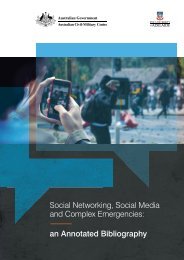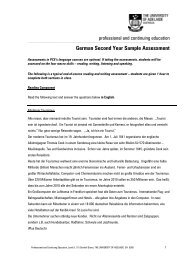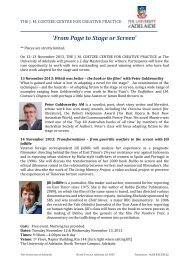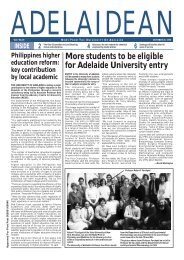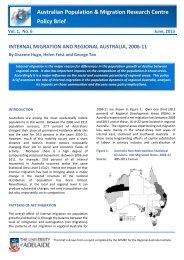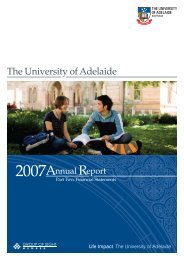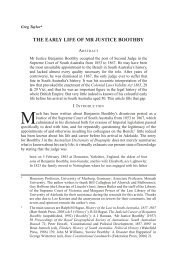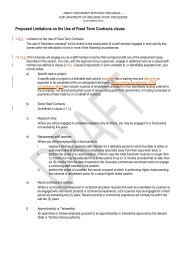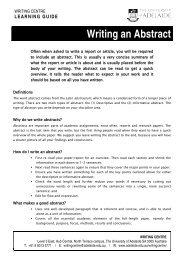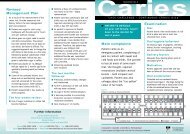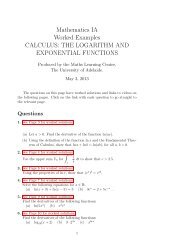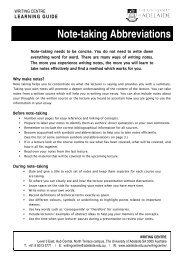Unbridling the Tongues of Women - The University of Adelaide
Unbridling the Tongues of Women - The University of Adelaide
Unbridling the Tongues of Women - The University of Adelaide
Create successful ePaper yourself
Turn your PDF publications into a flip-book with our unique Google optimized e-Paper software.
Edging out <strong>of</strong> <strong>the</strong> domestic sphere<br />
Reed’s policy inhibited even <strong>the</strong> tiny measure <strong>of</strong> re-distributing <strong>the</strong> colony’s wealth<br />
which <strong>the</strong> government allowances for boarding-out children could have constituted.<br />
It is possible, too, that <strong>the</strong>y saw <strong>the</strong> boarding-out subsidy as financial assistance given<br />
specifically to <strong>the</strong> women responsible for those households. I have not found any<br />
evidence to support such a suggestion, but both possibilities are at least consistent<br />
with Spence’s eagerness to claim that <strong>the</strong> Society’s supervision seldom led to reports<br />
that were derogatory about <strong>the</strong> households where children were boarded out.<br />
<strong>The</strong> o<strong>the</strong>r possible complication arises from <strong>the</strong> same source. Clark’s and Spence’s<br />
annoyance with Reed clearly reflected indignation at bureaucratic action denigrating<br />
<strong>the</strong> importance <strong>of</strong> <strong>the</strong> society’s work: at a man undervaluing a group <strong>of</strong><br />
women working on his own patch <strong>of</strong> <strong>the</strong> public sphere. Clark and Spence wanted<br />
acknowledgment <strong>of</strong> <strong>the</strong> kind that <strong>the</strong>y saw Clark’s cousins, Frances Power Cobbe,<br />
Louisa Twining, Mrs Nassau Senior, Octavia Hill – to name only a few – gaining for<br />
similar work in England. 43 In this <strong>the</strong>y were successful.<br />
<strong>The</strong> Society’s work achieved for it, eventually, inclusion among <strong>the</strong> government’s<br />
instrumentalities. A parliamentary commission, appointed to examine <strong>the</strong> operation<br />
<strong>of</strong> legislation concerning <strong>the</strong> destitute, passed in 1881, and to investigate allegations<br />
<strong>of</strong> mistreatment and proselytising in <strong>the</strong> state’s reformatories, found <strong>the</strong> evidence<br />
that Emily Clark and Ca<strong>the</strong>rine Spence submitted to it impressive. <strong>The</strong> Commission’s<br />
report, made in 1885, recommended that a council be appointed to take over<br />
those functions <strong>of</strong> <strong>the</strong> Destitute Board that were concerned with children, and <strong>the</strong><br />
functions <strong>of</strong> <strong>the</strong> Boarding-Out Society. It also recommended specifically that members<br />
<strong>of</strong> <strong>the</strong> council include Miss Clark and Miss Spence. If such recognition was a<br />
goal in <strong>the</strong> sub-script <strong>of</strong> Clark’s and Spence’s endeavours, <strong>the</strong>n <strong>the</strong>ir appointments<br />
were a triumph. <strong>The</strong> State Children’s Council, gazetted in December 1887, had 11<br />
members, seven <strong>of</strong> <strong>the</strong>m women, among <strong>the</strong>m Miss Spence and Miss Clark. 44 Its<br />
first president was Edward Charles Stirling, a young man Spence had known well<br />
during his boyhood in South Australia, recently returned to <strong>the</strong> colony with a string<br />
<strong>of</strong> degrees from Cambridge, and by <strong>the</strong>n teaching physiology at <strong>the</strong> new <strong>University</strong><br />
<strong>of</strong> <strong>Adelaide</strong>. 45 But Stirling did not remain on <strong>the</strong> Council for long: throughout 1888<br />
<strong>the</strong> voluntary Council quarrelled with <strong>the</strong> government’s chief secretary; it resigned<br />
in a body in January 1889; and, when after Spence recalled, ‘great searchings <strong>of</strong><br />
heart’, its members resumed <strong>the</strong>ir voluntary <strong>of</strong>fices, Stirling and one o<strong>the</strong>r member,<br />
refused reappointment. 46 <strong>The</strong> Council met monthly to direct <strong>the</strong> work <strong>of</strong> its<br />
small government-appointed paid staff, whom Spence considered grossly underpaid.<br />
87



